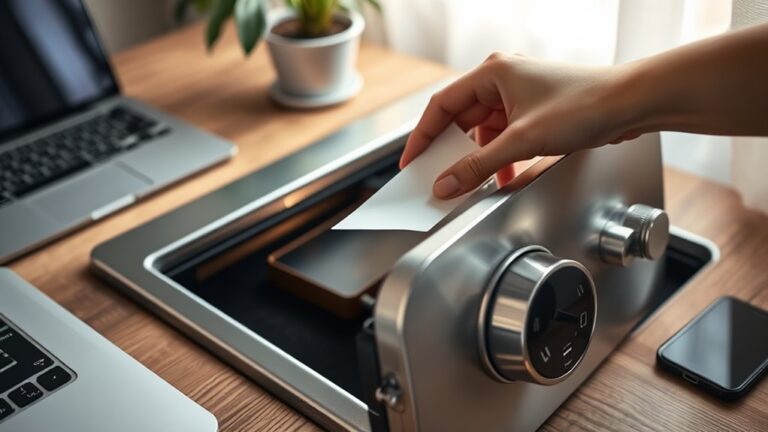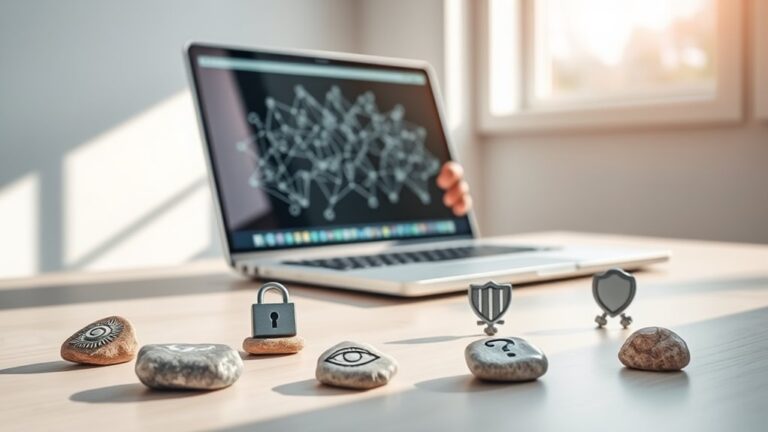
Secure Your Crypto Wallet: Essential Tips to Protect Your Assets
Securing cryptocurrency wallets requires multiple layers of protection. Users should store private keys and seed phrases offline, select appropriate wallet types based on security needs, and implement multi-factor authentication on all accounts. Regular software updates help prevent malware infiltration, while thorough backup strategies prevent permanent fund loss. Hardware wallets offer strong security by keeping assets offline. Creating multiple recovery options in secure physical locations will greatly enhance overall protection against potential threats.
Key Takeaways
- Store private keys and seed phrases offline in secure physical locations to prevent unauthorized access.
- Use hardware wallets to keep your cryptocurrency assets isolated from internet-connected devices.
- Enable multi-factor authentication on all crypto accounts to block 99.9% of automated attacks.
- Protect against malware by installing security updates and avoiding suspicious browser extensions or applications.
- Create multiple backups of recovery information and store them in separate, secure locations to prevent permanent loss.
Understanding Private Keys and Seed Phrases

The foundation of cryptocurrency security rests on understanding private keys and seed phrases. Private keys are alphanumeric codes that grant exclusive control over cryptocurrency funds, enabling transaction authorization and proving ownership. These 256-bit keys must remain confidential to prevent unauthorized access.
The integrity of your cryptocurrency holdings depends entirely on protecting your private keys—the digital signatures that prove ownership.
Seed phrases serve as vital backups for private keys, typically consisting of 12, 18, or 24 words arranged in a specific sequence. They allow users to recover wallet access if the original device is lost or damaged.
Both private keys and seed phrases should be stored securely offline, protected from physical damage and digital threats. Additionally, consider using hardware wallets to keep your seed phrases disconnected from the internet.
Never share these credentials with anyone or store them digitally without proper encryption. Their security directly determines the safety of crypto assets, making proper management essential for all cryptocurrency users.
Choosing the Right Wallet Type for Maximum Security

Selecting an appropriate cryptocurrency wallet represents one of the most critical decisions for protecting digital assets, as each wallet type offers different balances of security and convenience.
Cold wallets provide enhanced protection by keeping assets offline, while hot wallets prioritize accessibility at the cost of increased vulnerability to online threats.
Hardware wallets offer a middle ground, combining reasonable security with usability through physical devices that store private keys.
- Loss of life savings can occur within minutes if choosing an improperly secured wallet type.
- Peace of mind comes from knowing your assets are protected against sophisticated attacks.
- Future financial independence depends on selecting wallet security appropriate for your holding value.
When evaluating options, consider your trading frequency, security needs, and the importance of multi-chain support. Additionally, regularly checking for firmware updates on your hardware wallet can help mitigate potential security risks.
Implementing Multi-Factor Authentication Measures

Beyond wallet selection, implementing multi-factor authentication (MFA) stands as a foundational practice for cryptocurrency security that dramatically reduces the risk of unauthorized access. According to Microsoft, MFA blocks 99.9% of automated attacks, including credential stuffing and phishing attempts.
Effective MFA combines multiple verification methods: knowledge factors (passwords), possession factors (security tokens or smartphones), and inherence factors (biometrics). App-based authenticators that generate time-based codes provide stronger protection than SMS methods, while hardware security tokens offer additional protection. Additionally, MFA is crucial for crypto accounts because stolen cryptocurrencies are often irrecoverable.
Layered authentication creates digital armor by combining what you know, what you possess, and who you are.
To implement MFA effectively, users should enable it across all crypto accounts, establish secure backup methods, regularly update security applications, and maintain strong password practices.
Despite potential setup challenges and user resistance, the significant security benefits make MFA implementation essential for anyone serious about protecting their digital assets.
Safeguarding Against Network Vulnerabilities and Malware

Countless network vulnerabilities and malware threats pose significant risks to cryptocurrency wallets, requiring users to implement robust security measures to protect their digital assets. These threats range from 51% attacks on blockchain networks to sophisticated malware designed specifically to steal private keys and seed phrases.
- Browser extensions that seem legitimate may actually monitor transactions and steal credentials, compromising wallet security without detection.
- Infostealers can silently capture keystrokes and screenshots, potentially exposing private keys when users access their wallets.
- Phishing attacks trick users into revealing sensitive information by mimicking trusted crypto platforms, leading to immediate asset loss.
Users should regularly update their operating systems and wallet software, use only reputable applications, and implement thorough anti-malware solutions to mitigate these threats effectively. Additionally, being aware of common pitfalls associated with cryptocurrency investments can further enhance your security against potential scams.
Creating a Comprehensive Backup and Recovery Strategy

Though cryptocurrency offers unprecedented financial freedom, this independence comes with the serious responsibility of safeguarding access to digital assets through proper backup procedures. Without adequate backups, users risk permanently losing access to their funds—an unfortunate reality for many crypto holders.
| Backup Method | Security Level | Recommended Storage |
|---|---|---|
| Seed Phrase | Very High | Offline (fireproof safe) |
| Private Keys | High | Multiple secure locations |
| Wallet Files | Medium | Encrypted storage devices |
Experts advise implementing multiple backup methods while avoiding cloud storage services, which present significant security risks. Regular verification guarantees backups remain functional, while keeping copies in different physical locations protects against disasters. Remember that an estimated $140 billion in Bitcoin remains inaccessible due to lost recovery information—a stark reminder of backup importance. Additionally, using trusted key management systems can further enhance the security of your backup strategy.
Frequently Asked Questions
Can I Recover My Crypto if I Lose My Hardware Wallet?
Cryptocurrency owners can recover their assets if a hardware wallet is lost. Recovery requires the original seed phrase, which allows them to import their wallet into a new device or compatible software wallet.
How Often Should I Rotate or Change My Wallet Passwords?
Wallet passwords should be changed after compromises, breaches, or exposure to risks. Users should prioritize immediate rotation following security incidents, while routine changes depend on individual risk factors and wallet accessibility.
Are Mobile Wallets Secure Enough for Large Cryptocurrency Holdings?
Mobile wallets generally aren’t recommended for large cryptocurrency holdings due to exposure to malware, phishing, and device theft risks. Hardware wallets or cold storage solutions provide better security for significant investments.
How Can I Verify a Wallet App’s Legitimacy Before Downloading?
Verifying wallet legitimacy requires checking official sources, researching developer transparency, reading community reviews, confirming app store verification, and examining security features like encryption standards and two-factor authentication before downloading any cryptocurrency wallet application.
What Insurance Options Exist for Cryptocurrency Theft or Loss?
In a digital Wild West of trillion-dollar heists, cryptocurrency owners can access various insurance options: Commercial Crime Insurance, Specie Insurance for cold storage, Crypto-specific Theft Insurance, and specialized coverage with adjustable limits for price fluctuations.
Conclusion
Securing your cryptocurrency requires consistent effort beyond initial setup. While some may consider extensive security measures too time-consuming, the potential loss of assets far outweighs this inconvenience. By implementing proper key management, selecting appropriate wallet types, utilizing multi-factor authentication, defending against network threats, and maintaining robust backup strategies, investors can considerably reduce vulnerability to theft and protect their digital wealth for the long term.














